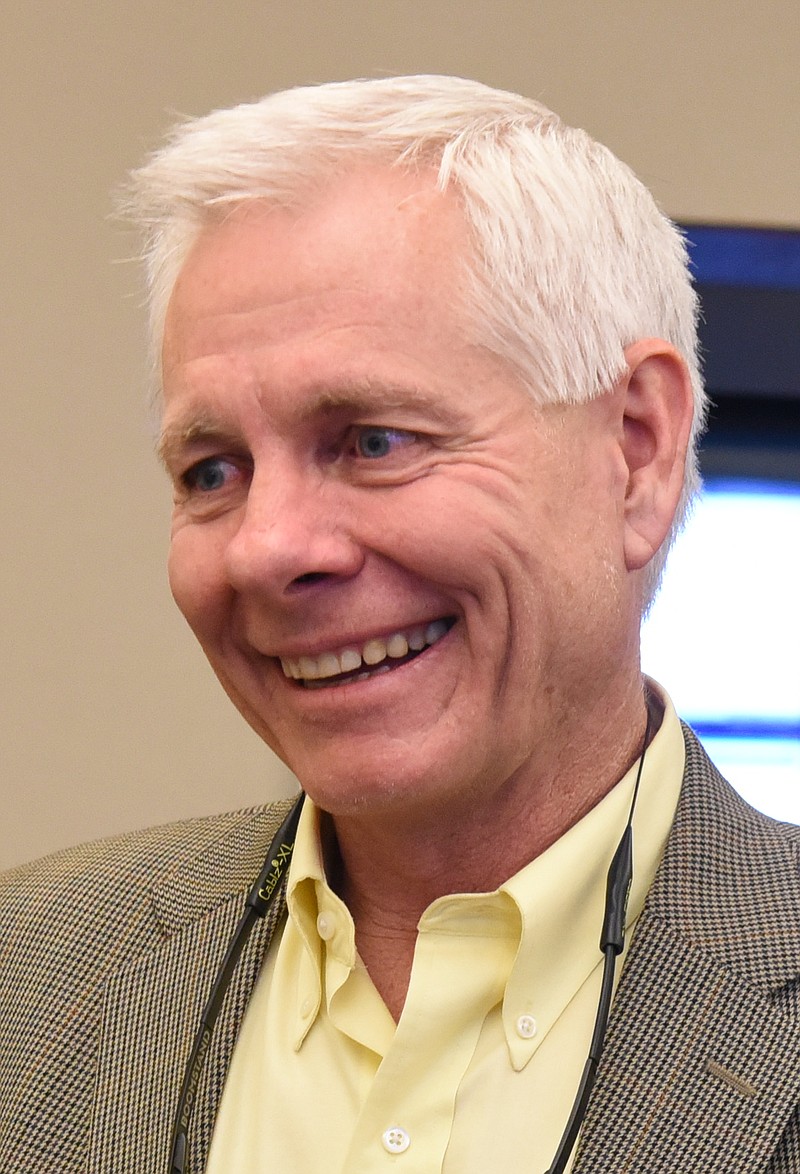When David Wade joined Chattanooga's Electric Power Board in 1983 as a line helper digging holes and setting power poles, he was simply looking for a job with more security to build his career.
But the Chattanooga native and future head of EPB says he quickly saw the value of the city-owned utility was far more than personal.
"I was looking for a job where I could build a career, but EPB is really a place that helps build our entire community," Wade said Friday after being elevated to EPB's top spot."I think the people here recognize the key role we have and will play for Chattanooga."
On Friday, more than 33 years after he began work at EPB, Wade was elected by the utility's five-member board as chief executive of EPB, effective Sept. 1. He will succeed Harold DePriest, who is retiring after 45 years with EPB, including two decades as its leader.
Wade is only the seventh person to head EPB since its creation by the city of Chattanooga in 1935. The 57-year-old engineer worked his way up through EPB's organization while earning his engineering degree at the University of Tennessee at Chattanooga.
Wade was named vice president of engineering for EPB in 2002 and seven years later began designing and building the fiber optic network that EPB launched to help upgrade its electricity network.
The fiber network also allowed EPB to begin to provide high-speed telecommunications services for its customers. Backed by an $111.6 million federal stimulus grant, EPB in 2010 launched America's first citywide gigabit-per-second internet service, which helped Chattanooga lay claim to being "Gig City."
EPB Chairman Joe Ferguson praised Wade's work in building EPB's fiber optic system, which has attracted more than 82,000 paying customers and generated enough revenue to help keep electricity rates about 5 percent below what they otherwise would be without the telecom system.
"David is also a visionary leader with a deep understanding of technology," Ferguson said in a statement Friday. "He has played a critical role in transforming EPB's culture and in leading the deployment of Chattanooga's fiber optic network and smart grid. He is uniquely qualified to build on EPB's record of success."
Wade said he will take the helm of EPB with the utility's finances in good shape.
"Our telecom debt continues to go down and we continue to look for new and better ways to use this technology," he said.
EPB's fiber network is being studied by researchers from the Oak Ridge National Laboratory on how to use the massive amounts of information collected from the smart grid to improve power reliability and services. EPB serves more than 170,000 customers with electricity in a 600-square-mile area of Chattanooga.
"EPB has always been strong in taking on and accomplishing big projects and we continue to look for ways to utilize the network we have built," Wade said.
One project Wade will be taking on this fall is to try to convince state lawmakers to allow EPB and other municipal power utilities the ability to extend its telecom services into neighboring areas outside of its power service territory. Wade, an affable engineer used to building project admits he never envisioned playing a political role. But as EPB has attracted global attention as an example of municipal broadband success, he is joining the push to lift state restrictions on such utilities.
"Our neighbors want these services and we believe we are well equipped to provide them," he said.
But Tennessee state law now restricts municipal power utilities from serving customers outside of the power territories defined by the Tennessee Valley Authority.
Private telecom providers like Comcast and AT&T question why government utilities, which enjoy the financial backing of local governments, should be allowed to compete with them, especially in risky ventures.
"Broadband networks are expensive to construct and upgrade," said Dr. George Ford, chief economist for the conservative Phoenix Center for Advanced Legal and Economic Public Policy Studies. "If there's money to be made, then private providers will make the necessary investments. Getting broadband to unserved areas is a difficult and expensive proposition, since by definition investing where the private sector will not will assuredly lead to financial losses and thus higher taxes or electricity rates to cover the difference."
But Wade said EPB has proven its success in serving a wide area with high-speed broadband and attracting the customer base and using the network in multiple ways to make its successful without having to use electricity ratepayer or local taxpayer dollars.
Wade said his management approach at EPB is similar - bring people together and to let them find new approaches to problems.
"One of the challenges any organization has is to get smart people and then to let them be smart," Wade said. "Our team is fantastic and they work hard to make it work."
Outside of work, Wade has shown his own commitment to hard work over the past four years. Since 2012, Wade has lost 120 pounds and gone from a largely sedentary lifestyle to working out regularly. In the past year, he has competed in several Ironman contests, which include a 2.4-mile swim, a 112-mile bicycle ride and a 26-mile running marathon.
Wade, who has been married for 37 years and is the father of two sons and a daughter, said he decided to get off the couch and start working for the sake of his health and future for his children.
"I started working out and liked it, got more energy, and just kept going," he said.
That's not unlike his own career path at EPB. Wade said he continues to enjoy making a difference for Chattanooga.
"That's what keeps EPB vital and going," he said.
Contact Dave Flessner at dflessner@timesfreepress.com or at 757-6340.
